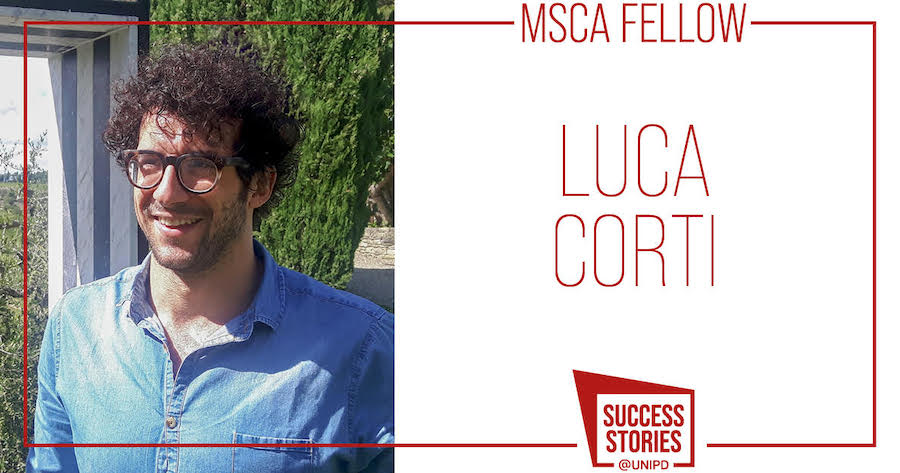
MSCA Fellow: Luca Corti
Experiencing different research and teaching practices, in different contexts, has been a very enriching experience. There are many things I have learned in different places. I try to take home the best from each experience, and integrate what I’ve learned into what I do at the moment.

Luca Corti studied philosophy in Italy, Germany and the United States, obtaining his PhD at the Research Center on Classical German Philosophy in Padua. Working on topics such as Classical German Philosophy, American Philosophy, epistemology and theory of norms, he has been awarded a DAAD Post-Doctoral Fellowship at the University of Bonn, a Marie-Curie Co-Fund Post-Doctoral Fellowship at the University of Louvain, a Swiss-Excellence Post-Doc at the University of Zurich and an FCT post-Doctoral Fellowship at the University of Porto.
He has been awarded a MSCA Individual Fellowship in 2018, under the supervision of Prof. Luca Illetterati at the Department of Philosophy, Sociology, Education and Applied Psychology.
Can you tell us in brief what your MSCA IF research project is about?
My research concerns the way we conceptualize "nature" and some natural entities: above all, living beings. According to a standard view, "nature" is a big clockwork: a realm where entities regularly follow certain laws. The typically modern conception of nature, emerged after the scientific revolution, sees it as a disenchanted realm – to use a famous expression of Max Weber. There are no values in it, no "oughts", and no norms. Norms are at most projected by us, human beings (and some people think this is a good thing, as the idea that there are natural norms is dangerous).
However, this kind of philosophical conception has several problems: it gives us a picture of nature as a passive realm, devoid of values in itself, and therefore usable or manipulable by humans. According to some scholars, this leads, among other things, directly into ecological crisis. But are we sure that we are justified in denying all normative and evaluative dimensions in nature? Aren't some natural beings – mostly, living beings – in themselves manifesting various sorts of normativity? Aren't there objective "goods" or "bads" for animals that are not only projection of human norms?
There is a long tradition that thematizes these issues, beginning with classical German philosophy – particularly Kant and Hegel. My project NINA (Norms in Nature) tries to elaborate a viable paradigm to grasp that normative element in the natural domain, without ending up in a position according to which nature "prescribes" things, or entities should perform certain tasks "by nature." NINA recovers classical ideas and develops them in conversation with the current landscape. The aim is to elaborate an idea of normativity related to the phenomena of living things, in dialogue with current biology and current views on organism.
You studied and worked as a postdoc in different Universities, in Italy, Germany, Portugal and in the USA. What did you learn in those different environments? Are you able to integrate the different approaches to research, if any?
Experiencing different research and teaching practices, in different contexts, has been a very enriching experience. There are many things I have learned in different places. I try to take home the best from each experience, and integrate what I've learned into what I do at the moment. The teaching, for example, is very different from country to country. I've tried to introduce various methods in my current practice in Italy.
You applied for a MSCA Individual Fellowship first under call 2017, but you did not get funded; you then applied in 2018 again and you obtained the grant: what made the difference, in your opinion?
The 2017 and 2018 project were based on the same idea and were very similar in many respects. However, in the first version I did not make enough space to explain and contextualize my project in a broader framework (not only philosophical). The first evaluation report made it clear that several things in the Excellence part, which was clear in my head, needed to be made fully explicit (and justified). I worked on this and the second version had new parts aimed at justifying the relevance of my project for scholars who had a different expertise than mine. In retrospect, I would have shown the 2017 project to more people from outside my circle so that those questions could be clarified right away.
Has the COVID 19 pandemic affected your research? How?
The pandemic deeply affected my project, especially in terms of mobility. Fortunately I work in the humanities and I do not need a lab, so I got to work and publish as expected. But I missed not being able to interact personally with people, I missed being able to organize in-person conferences. That was a common problem with Covid. When I finally could work properly, it was a wonderful experience.
Would you offer as MSCA supervisor if asked for?
I just did it! Given how important the Fellowship has been for me – it allowed me to pursue cutting-edge research, to work in stimulating environments, and finally get a permanent position – it has always been my intention to act as a supervisor. For me, the mobility of ideas and people is a key element of research. So now that I have a position as Associate Professor and can act as a supervisor, I am trying to attract researchers and support them as much as possible to work in my group. This year I expect two applicants in Padua. Next year who knows, I hope more. Anyway, anyone who reads this interview, is interested in my research topic and in applying for a MSCA-PF, should contact me.
What would you suggest to a researcher that is thinking about applying for a MSCA-PF?
I would recommend to give it a shot and try to write a proposal. Also because the whole process of proposal writing – finding a supervisor, developing an idea together, writing it down as a project – is actually scientifically enriching. I would not recommend to do everything alone: it is more difficult and less useful. Having comments and remarks from the outside is helpful – at least, that has been the case for my application and the application of many friends who got the MSCA fellowships. It is a unique opportunity in my view.
International Research Office
via Martiri della libertà 8, 35137 Padova, Italy
tel. +39 049.827 1947 / 1948 / 1945
fax +39 049.827 1911
international.research@unipd.it


